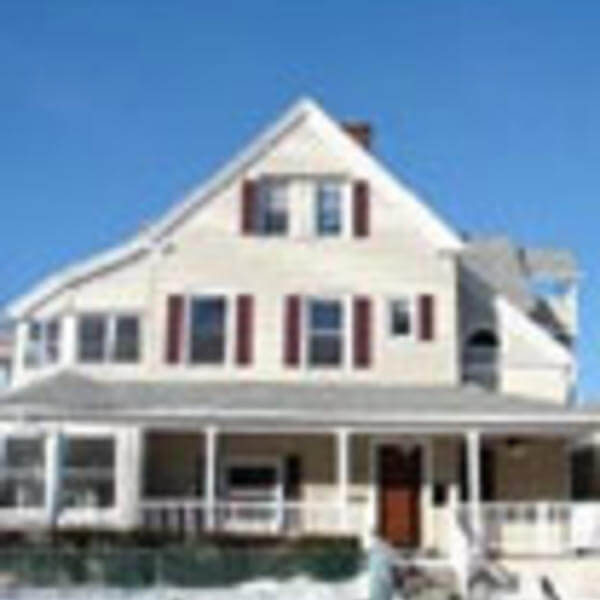Holy Cross’ long history with Dismas House, a model community program for former prison inmates, has reached another milestone. With this new chapter, the engaged learning and social justice opportunities that are a hallmark of Holy Cross have been enhanced.
Plus, the Worcester nonprofit, which provides critical services in the community, gains additional and much needed resources during this tough economic time.
How did these pieces come together to benefit both Holy Cross and Dismas? With funding through a new federal and state initiative aimed at placing AmeriCorps VISTA (Volunteers in Service to America) workers in community organizations, Holy Cross and Dismas House successfully applied to host a position. As a result, a full-time volunteer will serve at Dismas House for one year.
Very good news indeed for Dismas, which has seen nearly half of its operating budget and workforce slashed this year.
The Dismas House VISTA volunteer is Kate Farrington, a recent graduate of St. Lawrence University and native of Brattleboro, Vt. Currently based at the main office on Richards Street, she will work at a new Dismas House location in rural Worcester County which is expected to open in the fall.
Farrington will facilitate the coordination of 25 volunteers from four Worcester colleges — including 10 from Holy Cross — who provide core services to Dismas House ranging from overnight supervision and job placement assistance to community service projects and cooking and sharing meals. She will also provide the agency with the capacity to continue and expand programs and services despite limited financial resources. She reports directly to David McMahon, co-executive director of Dismas House.
In addition to the VISTA worker, two Holy Cross students are working full-time at Dismas House this summer, filling a critical need after four out of the nine staff positions were eliminated earlier this year due to budget cuts. Caitlyn Cerundolo ’11, a psychology major from Lexington, is working through a Lilly Grant, and Linda Sula ’12, a chemistry major from Worcester, as a work study.
“These kinds of partnerships are the backbone of our Community-Based Learning program,” says Margaret A. Post, the program’s director. “The long term relationship we have with Dismas House and the multiple kinds of projects we do together are tremendously valuable to our work as educators. Our ongoing collaboration with Dismas House has been mutually beneficial for our students and the Dismas residents alike.”
The VISTA program is administered by the Massachusetts State Office of the Corporation for National and Community Service. Additional funding from the American Recovery and Reinvestment Act allowed the Massachusetts program to expand to the new core of community based volunteers. Katherine Robertson, special assistant to the president for community affairs, and Margaret Post applied for the grant through Massachusetts Campus Compact, a nonprofit coalition of college and university presidents committed to developing the civic skills of students, building partnerships with the community, and integrating civic engagement with teaching and research.
This is the first year that Massachusetts Campus Compact is assigning a VISTA to a community-based organization, in addition to an institution of higher education. The new program was designed for Campus Compact member campuses to support community partner organizations through the challenges of the current economic climate.
“This program provides Holy Cross with a wonderful opportunity to work with one of our community partners and provide them with the capacity to continue on in these tough economic times by capitalizing on the educational resources of the Worcester area,” says Robertson.
Holy Cross alumnus Terry Horgan ’67 helped found Dismas House in 1988. Holy Cross has been a strong supporter since its founding. Examples include:
* In 2007, a new Dismas location, Father John Brooks House, on Arthur Street was named after Rev. John E. Brooks, S.J., president emeritus at Holy Cross, for his continued support of the nonprofit.
* For years, Holy Cross students have cooked for and shared dinners with former inmates through SPUD (Student Programs for Urban Development), the College’s umbrella service organization.
* Work study students are placed at the organization during the academic year and summer months, boosting Dismas’ capacity to provide services to its residents.
* Robert Grenon, controller at Holy Cross, serves as treasurer of the organization and is a member of the board of directors; and Kathy Robertson assists with grant writing.
* Last year, Brian Engelehardt, assistant professor of economics, taught a Labor Economics class that examined the difficulties former prisoners face when trying to reenter the job market. This Community-Based Learning course had students calling employers to find out whether they would consider hiring former prisoners. “We now have resources for former prisoners who are looking for a job where they can target their applications to specific areas,” McMahon says.
* Engelehardt also recently assisted Dismas House staff and residents, along with individuals from the Oak Hill Community Development Corp. and other volunteers, in rebuilding a city playground on Banis Street that was vandalized years ago. The playground and Brooks House are located in the same neighborhood.
Holy Cross’ support over the years has been invaluable, says McMahon.
“At Dismas, we gain everything from increased capacity to grant writing to resources that a small nonprofit wouldn’t otherwise have,” he says. “Holy Cross is living out its values in the community by its involvement with Dismas.”
Pictured: The Father Brooks House is named after Rev. John E. Brooks, S.J., president emeritus of Holy Cross.
Related Information:
• Holy Cross in the Community
Tough Economic Times Bring New Opportunities for Campus-Community Partnerships, Real-World Learning Experiences

College has had strong ties with Dismas House since its founding in 1988
Read Time
4 Minutes